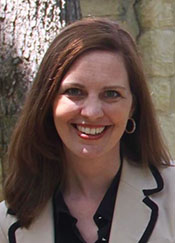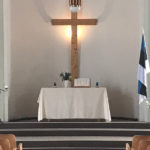One of the best things about parenting is the excuse to see animated movies without seeming weird. My family and I recently saw Kubo and the Two Strings, which is rendered beautifully in stop-motion animation. Set in Japan, the film tells the story of a boy, Kubo, who plays a magical shamisen, a traditional three-stringed lute with a square body.
 Ellen Di GiosiaKubo provides for his widowed mother by telling stories in the village square, accompanying them on his instrument. As he plays, the strings’ vibrations coax colorful squares of paper from a stack, and they soar through the air, folding themselves into intricate shapes. Origami warriors—heroes and villains—do battle as he plucks and strums, drawing crowds eager to see and hear the story.
Ellen Di GiosiaKubo provides for his widowed mother by telling stories in the village square, accompanying them on his instrument. As he plays, the strings’ vibrations coax colorful squares of paper from a stack, and they soar through the air, folding themselves into intricate shapes. Origami warriors—heroes and villains—do battle as he plucks and strums, drawing crowds eager to see and hear the story.
A mother’s love
Kubo and his mother live in a cave, hiding from the Moon King. After Kubo stays late one evening in the village, the daughters of the Moon King emerge and devastate the town. Kubo’s mother comes down from the cave and uses her final burst of magic to save her son. In her last moments, she urges Kubo to search for his father’s armor, which will protect him. Kubo takes a strand of his mother’s hair and keeps it close to him.
 Kubo joins two new friends, Monkey and Beetle, who help him on his quest. His magical shamisen calls forth origami that leads the way and even creates a boat for his journey. He finds his father’s breastplate, and Beetle takes up the bow. Kubo learns that Monkey and Beetle are more than just friends. They are his parents—although their human bodies have died, they have transformed until the time they can be reunited with their child.
Kubo joins two new friends, Monkey and Beetle, who help him on his quest. His magical shamisen calls forth origami that leads the way and even creates a boat for his journey. He finds his father’s breastplate, and Beetle takes up the bow. Kubo learns that Monkey and Beetle are more than just friends. They are his parents—although their human bodies have died, they have transformed until the time they can be reunited with their child.
The magic cannot last forever, though. In the battle with the Moon King’s daughters, Monkey and Beetle are killed. The first of the strings on Kubo’s shamisen is broken, and then the second, and the third. Finally facing the Moon King, Kubo picks up his instrument. Remembering his mother’s sacrifice, Kubo pulls out the strand of her hair he has kept close to him since her death. He winds it around the pins at each end of the neck of the shamisen. Then he pulls the string from his father’s bow and does the same. Finally, he plucks a hair from his own head for the third string.
The magic of his shamisen returns. The music he makes when his family strings come together defeats the Moon King. He joins his village in celebrating Obon, when the people visit the graves of their ancestors and commune with their spirits. Once they have spoken with their loved ones, the spirits are housed in paper lanterns and set adrift in the river. His mother and father, having protected Kubo and said goodbye, are released.
A lesson for us
There is a lesson for us here. I am not suggesting we worship our ancestors. They are not gods; they were human, with all the frailty that implies.
Sign up for our weekly edition and get all our headlines in your inbox on Thursdays
But it is a gift of the church that none of us is without mothers and fathers. Some among us were mothered or fathered poorly. Some have faced abuse and scorn at the hands of people who should have loved them. Some have come to faith without the benefit of family lineage. When our biological parents fail us, we look to men and women in our churches and faith traditions.
All Saints’ Day is Nov. 1. Many Free-Church Protestants do not celebrate the occasion, because our understanding of the word “saint” is different than that of our Catholic, Orthodox and Anglican friends. But if we say we believe all God’s people are saints, then that’s all the more reason to celebrate the day.
The Sunday school teacher who showed you love in the third grade? She’s a saint.
The deacon who faithfully visited the nursing home every Sunday afternoon and let you tag along? A saint.
The friend who encouraged you in your walk during high school, when you felt you were the only Christian at school? A saint as well.
None of them was perfect, and they did not perform miracles, but God used them to influence your life and draw you closer to Christ.
Our own faith has power, but when added to the heritage we have received, the magic is multiplied. Members of our faith families were the makers of sacred music on strings that now stretch across time and space, whose slightest words and actions sent vibrations of God’s Spirit into the world, where they finally reached our hearing.
They tell a story—The Story—of gospel love and sacrifice, of redemption and pardon, release and resurrection. If our ears are open to hear, we will enjoy a music that shapes us and, joined with our own strings, has the power to change the world.
Ellen Di Giosia is associate pastor of faith formation at Woodland Baptist Church in San Antonio.
















We seek to connect God’s story and God’s people around the world. To learn more about God’s story, click here.
Send comments and feedback to Eric Black, our editor. For comments to be published, please specify “letter to the editor.” Maximum length for publication is 300 words.